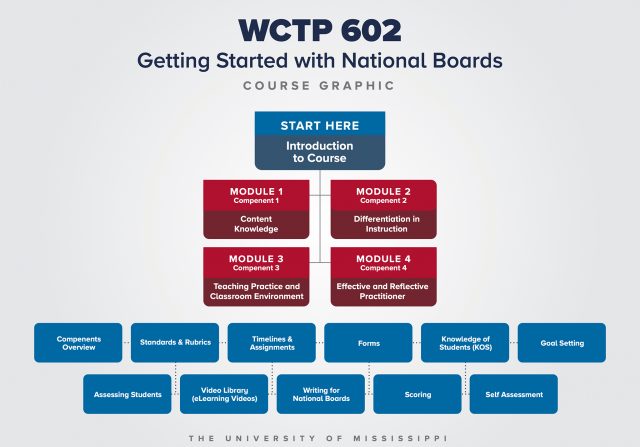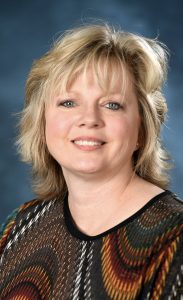
The university’s new World Class Teaching Program 602 is a thorough, self-paced, step-by-by step national candidate support program for teachers who are pursuing National Board certification.
OXFORD, Miss. – The University of Mississippi is extending the university’s commitment to supporting teacher education to a national level.
Based in the UM School of Education, the new World Class Teaching Program 602 assists and prepares school systems and teachers around the country for certification by the National Board for Professional Teaching Standards.
Launched in January, the online program is a national component to the university’s World Class Teaching Program, or WCTP, which was established on campus in 1998 to prepare Mississippi teachers for their National Board certification journey.
“National Board certification is considered the gold standard for teachers,” said Tammy Kirkland, coordinator of the WCTP and instructor in the School of Education. “The certification is a win-win situation for teachers, schools and students.
“Certification is a process that stretches teachers to utilize the knowledge of students in their instructional-making decisions. Teachers learn to use different teaching modalities based on their students, open and create doors of communication, and become reflective thinkers.
“At the heart of the certification is the students. As teachers grow and become accomplished educators, the students are directly impacted and benefit. No teacher can go through the process and come out unchanged.”
The new nationwide program is a thorough, self-paced, step-by-by step national candidate support program for teachers who are pursuing National Board certification. In the works since 2018, the program has been piloted with a few school districts nationwide.
“We are extremely proud of Tammy Kirkland and our World Class Teaching Program’s efforts to support Mississippi teachers through the National Board certification process, and WCTP 602 is another great example of how we provide online support for teachers,” said David Rock, dean of the School of Education and professor of teacher education. “The use of distance technology is vital to the growth of our teachers today and in the future.”
The national program, which is available for $135 annually, is intended for candidates who want supplemental support for their certificate pursuit, or who may have little or no local candidate support, especially rural teachers for whom candidate support is not available.
“This new program has been a goal that Mrs. Kirkland has had since she began working at a national level,” said Susan McClelland, UM chair of teacher education and professor of leadership and counselor education. “She has seen the need that teachers in other states have for effective support as they navigate the national board process, and her efforts have enabled the UM WCTP to have a national impact.
“The School of Education is committed to supporting professional and academic growth for practicing educators. We feel that we are able to serve the educational community by providing excellent graduate degree programs and professional development to meet the individual needs and goals of educators.”
National Board certification is open to teachers who have attained education, employment and licensure requirements, including earning a bachelor’s degree, holding a valid state teaching license and completing three years of teaching. Candidates must show advanced knowledge, skills and practice in their specific certificate area by completing four components: three portfolio entries and a computer-based assessment.
The certification process is managed by the National Board for Professional Teaching Standards, an independent, nonprofit organization that works to advance teaching for all students.
Categories for certification range across 16 disciplines, from art and English to science and world languages, and include developmental levels reaching students age 3 to 18.
The certification process can take anywhere from one to five years to complete, and the new Ole Miss program helps teachers navigate the process.

Tammy Kirkland is coordinator of the UM World Class Teaching Program and instructor in the School of Education. Photo by Kevin Bain/Ole Miss Digital Imaging Services
“The WCTP 602 course is step-by-step and specific,” said Kirkland, who has been a board-certified teacher since 2008 and became director of the university’s WCTP in 2014. “One of the main reasons teachers do not finish National Board certification is because they do not know how to get started.
“Our course divides the four components into five doable assignments. For those that want even more direction, we have timelines, both general and with dates. It also includes a self-assessment element, which leads the candidates to evaluate their work before submitting it using our evaluation forms.”
Only a handful of countrywide candidate support programs exist for National Board certification, Kirkland said.
“Our program takes into consideration all the elements involved in the process,” she said. “It is designed to assist candidates in understanding what they are being asked to do and why. The course also has professional development embedded as well, so no stone is left unturned.”
One of the program’s pilot school districts providing feedback and helping shape the final WCTP 602 product was Gulf Shores City Schools in Alabama, which entered the pilot program in July 2019.
Krista Marcum, who teaches Gulf Coast ecology, marine biology and biology at Gulf Shores High School, serves as the contact between Kirkland and the school district. She is vice president of the Alabama National Board Certified Teacher Network, a group of some 3,000 members who provide connections between Alabama’s board-certified teachers and the National Board and who also offer support, share ideas and concerns, work to improve schools, and seek leadership positions.
“Gulf Shores City Schools wanted to provide quality resources to help prepare our candidates for certification,” said Marcum, who has been certified since 2017 in adolescence and young adult/science. “WCPT 602 provided resources to help candidates dig into their standards and support candidates throughout each component of the National Board certification process.
“It was well-organized and additional resources were constantly being added, giving candidates up-to-date information and providing them step-by-step instructions.”
The nationwide program also recently received its first contract from the National Board for Professional Teaching Standards and has enrolled 192 Bureau of Indian Education candidates.
“Teachers in many rural areas of the country struggle to access quality professional development simply because of the distances involved in driving to a face-to-face session located hours away in the nearest city,” said Michelle Accardi, director of policy and partnerships for the National Board.
“The option for a self-paced virtual course like WCTP 602 will provide teachers the opportunity to improve their professional practice and have the support they need to become board-certified. This ultimately benefits thousands of students in rural and remote communities who will learn more as a result.”
Beyond furthering their excellence in the classroom, National Board certification also provides teachers with financial incentives and more in most states. In Mississippi, all eligible certified teachers are provided an annual salary supplement of $6,000, with teachers in 13 counties where there is a critical shortage of teachers receiving a total of $10,000.
In Mississippi, more than 4,400 teachers have earned National Board certification.
“Mississippi is one of the leading states in National Board certification in terms of candidates certificated, financial incentives and providing candidate support through six World Class Teaching Programs in the state,” Kirkland said.
“This is not the norm in the United States. Many states simply do not have the candidate support that we have or do not have an online component, meaning if the teachers wanted support, they would have to drive hours for it.
“WCTP 602 fills a need. Additionally, candidate support differs greatly from state to state if it is offered. For those teachers, this course is a vital supplement. At the University of Mississippi, we are always looking for innovative ways to meet needs and assist teachers to become lifelong learners.”